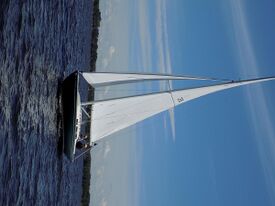Roue 20
Topic: Engineering
 From HandWiki - Reading time: 2 min
From HandWiki - Reading time: 2 min
 | |
| Development | |
|---|---|
| Designer | William James Roué |
| Location | Canada |
| Year | 1922 |
| Boat | |
| Boat weight | 4,700 lb (2,132 kg) |
| Hull | |
| Type | Monohull |
| Construction | Wood and fiberglass |
| LOA | 31.00 ft (9.45 m) |
| LWL | 21.00 ft (6.40 m) |
| Beam | 8.00 ft (2.44 m) |
| Hull draft | 4.2 ft (1.3 m) |
| Hull appendages | |
| Keel/board type | long keel |
| Rudder(s) | keel-mounted rudder |
| Rig | |
| General | Fractional rigged sloop |
| I (foretriangle height) | 26.80 ft (8.17 m) |
| J (foretriangle base) | 9.00 ft (2.74 m) |
| P (mainsail luff) | 35.30 ft (10.76 m) |
| E (mainsail foot) | 14.80 ft (4.51 m) |
| Sails | |
| Mainsail area | 261.22 sq ft (24.268 m2) |
| Jib/genoa area | 20.60 sq ft (1.914 m2) |
| Total sail area | 381.82 sq ft (35.472 m2) |
The Roue 20 is a Canadian sailboat, that was designed by William James Roué.[1][2][3]
Roué was born in Halifax, Nova Scotia in 1879. He lived in Dartmouth, Nova Scotia and worked from 1899 to 1931 for the family firm, Roué's Carbonated Waters, when he design the boat in 1922.[2][4][3]
Most sailboats are named for their imperial or metric length overall, but the Roue 20's designation instead indicates it was William J. Roué's 20th design.[2]
Design

The Roue 20 is a small recreational keelboat, built predominantly of wood, with wood trim, although some newer ones incorporate some fiberglass. It has a fractional sloop rig, a keel-mounted rudder and a fixed long keel. It displaces 4,700 lb (2,132 kg). The boat has a draft of 4.20 ft (1.28 m) with the standard keel.[1][3]
The design has a hull speed of 6.14 kn (11.37 km/h).[3]
See also
Related designs
Similar sailboats
- Beneteau 31
- Corvette 31
- Douglas 31
- Hunter 31
- Hunter 31-2
- Hunter 310
- Hunter 320
- Marlow-Hunter 31
- Tanzer 31
References
- ↑ 1.0 1.1 Browning, Randy (2017). "Roue 20 sailboat specifications and details". sailboatdata.com. https://sailboatdata.com/sailboat/roue-20. Retrieved 7 October 2017.
- ↑ 2.0 2.1 2.2 Browning, Randy (2017). "William J. Roué 1879-1970". sailboatdata.com. https://sailboatdata.com/designer/roue-william-j. Retrieved 7 October 2017.
- ↑ 3.0 3.1 3.2 3.3 Sea Time Tech, LLC (2022). "Roue 20". sailboat.guide. https://sailboat.guide/roue-20.
- ↑ Sea Time Tech, LLC (2022). "William J. Roué". sailboat.guide. https://sailboat.guide/william-j-roue.
External links
 |
 KSF
KSF